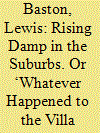|
|
|
Sort Order |
|
|
|
Items / Page
|
|
|
|
|
|
|
| Srl | Item |
| 1 |
ID:
165562


|
|
|
|
|
| Summary/Abstract |
Will the British welfare state revert to an Americanisation trajectory or retain features of the European model after April 2019? After a period of historically prolonged austerity and substantial working age welfare reform, with the UK facing yet another renegotiation of the social contract in a post‐Brexit world, the question of whether there remains space for an alternative to the ‘American’ model is of crucial importance. We argue that there has been a blurring of differences across the American and European welfare states in terms of working age benefits, as most countries have adopted aspects of work‐based conditionality reforms, which attach the receipt of benefits to the active pursuit of work and, to varying extents, the underlying politics of US welfare reform, where there are large coalitions supportive of more punitive policies towards low‐income adults and minorities. These trends are taking place against the backdrop of a second major shift: increasing restrictions on benefits for immigrants. This double narrowing of the welfare state, making benefits conditional for citizens and excluding those who are not citizens, seemingly sets the agenda for a more restrictive post‐Brexit welfare state. The experience of the last two decades suggests, however, that the adoption of the American model has not been wholesale; steering a middle path between punitive conditional American benefits and more traditionally generous universal benefits is on the agenda across advanced welfare states.
|
|
|
|
|
|
|
|
|
|
|
|
|
|
|
|
| 2 |
ID:
165567


|
|
|
|
|
| Summary/Abstract |
Social democratic politics in Britain requires compelling answers to three animating questions that Roy Jenkins posed in his landmark 1979 Dimbleby lecture. Firstly, how can the British system of democracy be reformed to develop a culture of political participation and pluralism that leads to more equitable economic and social policies? Secondly, how can the centre‐left and left unite to forestall long periods of Tory dominance in electoral politics, thereby avoiding calamities such as the 2016 referendum on EU membership? And, thirdly, how can a flourishing intellectual ecosystem be cultivated on the progressive left that generates radical ideas for economic and social reform, recognising the importance of concerted dialogue between political traditions? This article revisits Jenkins’ 1979 lecture by considering the prospects for ‘breaking the mould’ of British politics in the ‘new hard times’ of Brexit and ‘permanent austerity’.
|
|
|
|
|
|
|
|
|
|
|
|
|
|
|
|
| 3 |
ID:
165555


|
|
|
|
|
| Summary/Abstract |
One of the longest‐running debates in urban development, enshrined within the evolution of the British planning system, is how best to capture the increased value of land arising from development. This article outlines the historic and contemporary context before proposing an approach towards ‘land value capture’, based on practice in continental Europe but adapted to Britain's specific circumstances. In doing so, it also sets out why new approaches are needed as part of the search for better ways of funding local infrastructure, developing mixed communities and improving Britain's suburbs for the benefit of all.
|
|
|
|
|
|
|
|
|
|
|
|
|
|
|
|
| 4 |
ID:
165556


|
|
|
|
|
| Summary/Abstract |
The English suburbs are dying. Years of austerity have slowly changed the landscape. Poverty is now common in the suburbs. Since 2014, life expectancy has been falling across most of England, especially in the suburbs. Now infant mortality rates are also rising year on year (unlike anywhere else in Europe). In hindsight it is not surprising that the majority of suburban English people voted Brexit, most noticeably in the Home Counties. Middle England is understandably angry. No more fortitude in the face of adversity and the hiding of emotions. The stiff up lip has slipped. Change is in the air.
|
|
|
|
|
|
|
|
|
|
|
|
|
|
|
|
| 5 |
ID:
165560


|
|
|
|
|
| Summary/Abstract |
The notion of ‘suburbia’ is increasingly useless as a singular, simple description of place, identity or political culture. Focusing particularly on ethnic and religious diversity highlights the intensely differentiated nature of outer London. The tropes of ‘Metroland’, and ‘leafy suburbia’ deflect from recognition of this diversity, and the broadly‐found expectations about patterns of migration, suburbanisation and cultural change loosely associated with the Chicago School of urban sociology have less and less applicability to modern London. Religious and ethnic diversity in suburbia poses significant challenges for political parties. In particular, Labour's difficulties in appealing to different constituencies, often expressed geographically in terms of the differences between inner London and the white working class areas of post‐industrial Britain, are also present in the micro‐politics of adjacent areas of outer London. New forms of religion, and especially the development of large new worship spaces, increasingly common in outer London, also have significant consequences for the local politics of suburbia.
|
|
|
|
|
|
|
|
|
|
|
|
|
|
|
|
| 6 |
ID:
165565


|
|
|
|
|
| Summary/Abstract |
This article reports black and Asian descriptive representation in London's elected local government. In both absolute and relative terms, the levels of descriptive representation are higher than previously, and London's Asian population is now represented proportionately, although black Londoners remain under‐represented. Such aggregate levels of representation, however, mask considerable disparities between the two groups in many instances. The same is true of gender representation, with overall figures hiding the fact that Asian men are over‐represented (and white women broadly proportionately represented) while black men are the least represented category analysed.
|
|
|
|
|
|
|
|
|
|
|
|
|
|
|
|
| 7 |
ID:
165561


|
|
|
|
|
| Summary/Abstract |
Considering its conservative past, South Korea is undergoing an unprecedented turn to the left. Since priority was given to economic growth from the 1960s until the beginning of the 1990s, a close alliance between big business and government has characterised the country's labour market. Since the 1997 financial crisis, however, two decades of liberal and conservative governments have pushed a neoliberal agenda of labour market flexibilisation, which has resulted in growing inequality in a dualised labour market and left the trade unions in a marginal role. Following a rapid turn of events that led to the impeachment of conservative president Park Geun‐hye, left‐leaning President Moon Jae‐in seems determined to roll back this legacy of labour oppression with the strong support of trade unions and young voters. His administration is pushing for policy change with a series of expansionary active labour market policies aimed at promoting stability and full‐time employment. This article highlights the social‐democratic character of these reforms and the constraints in implementing them.
|
|
|
|
|
|
|
|
|
|
|
|
|
|
|
|
| 8 |
ID:
165554


|
|
|
|
|
| Summary/Abstract |
The idea of suburbia, or the suburban, or the suburbs, can imply a number of different things. Suburbia suggests a physical place, in general the outskirts of a city or large town; suburban can infer a certain lifestyle; and the idea of the suburbs is often used to identify a community or class of people who inhabit a specific territory. In politics, these terms can also retain various meanings in terms of geography, culture or community. Alongside the ideas of the urban or the rural, they are often used to debate questions of political strategy and shifting electoral coalitions. In this article, ideas of urban and suburban places, cultures and communities are used to consider wider debate regarding future coalitions and strategy within the modern left, specifically a renewed urban politics that can be identified. This new ‘urbanism’ suggests a geographical realignment—partly on cultural or lifestyle grounds—which is significant within an overall attempt to redefine the ‘base’ of the left in terms of class and community. This article considers these issues with reference to what historically has been described as the ‘Progressive Dilemma’.
|
|
|
|
|
|
|
|
|
|
|
|
|
|
|
|
| 9 |
ID:
165566


|
|
|
|
|
| Summary/Abstract |
This article analyses the content of the 2017 general election manifestos, and introduces the latest estimates from the Manifesto Project to explore recent ideological movements in the British party system. It reports the changing policy emphases in Conservative and Labour manifestos and the ideological positions of the major political parties in 2017. It finds that Theresa May's party produced its most left‐wing manifesto since 1964, and that Jeremy Corbyn's party produced its most left‐wing manifesto since 1992 and the election before the advent of New Labour. The article also finds that the ideological space between the Conservatives and Labour opened up in 2017, and that Northern Ireland's Democratic Unionists published the most right‐wing manifesto.
|
|
|
|
|
|
|
|
|
|
|
|
|
|
|
|
| 10 |
ID:
165552


|
|
|
|
|
| Summary/Abstract |
norman birnbaum, who has died at the age of 92, was a highly valued and regular contributor to Political Quarterly over many years. In 2011 he received the Crick Prize at the Orwell Awards for the best article in PQ in 2010. He travelled to London especially for the prize and delivered a memorable speech. The prize was awarded for his article ‘American progressivism and the Obama presidency’ (PQ 81:4) and was typical of his writing which always embodied the qualities PQ exists to promote—engaged, direct, authoritative, and written in plain English. Norman was a public intellectual of a rare kind.
|
|
|
|
|
|
|
|
|
|
|
|
|
|
|
|
| 11 |
ID:
165568


|
|
|
|
|
| Summary/Abstract |
The Recall of MPs Act 2015 allows constituents to petition for their MP to be unseated. A petition of recall is opened, for six weeks, if an MP has received a custodial sentence or been suspended from the House of Commons for ten or more sitting days. Should 10 per cent of constituents sign the petition, a by‐election is required, which the deposed MP has the right to contest. The first test of the Act came in 2018, when Ian Paisley, MP for North Antrim, was suspended from the Commons for thirty days. This article examines how the Act was implemented and assesses whether procedural oddities played any part in the petition failing to attract sufficient signatures to trigger a by‐election.
|
|
|
|
|
|
|
|
|
|
|
|
|
|
|
|
| 12 |
ID:
165553


|
|
|
|
|
| Summary/Abstract |
This introduction highlights four themes about the politics of suburbia which are developed in the collection. First, what constitutes suburbia is multiple and constantly changing. This is reflected in diverse and evolving architectures and economic conditions. Second, the idea of the suburb as synonymous with the pinnacle of betterment is taking a battering as suburbs are now looking the worse for wear. ‘Just about managing’ families and the ‘squeezed middle’ are to be found in the suburbs. Third, in post‐2016 Britain, Brexit is the new political fault‐line where regional variations manifest themselves, and this is reflected in distinctive suburban politics, producing strange bedfellows spanning Surrey and Sunderland. Fourth, voting patterns reflect the dynamism of the modern suburb. The social and physical environment of the suburb may shape attitudes to some extent, but incomers have brought their politics with them.
|
|
|
|
|
|
|
|
|
|
|
|
|
|
|
|
| 13 |
ID:
165563


|
|
|
|
|
| Summary/Abstract |
Labour's 2017 general election manifesto contained a pledge to ‘end the punitive sanctions regime’ in the British welfare state. Whilst the specific implications of this pledge were not elaborated, such a policy would nevertheless constitute a profound break with a welfare consensus spanning over twenty years. The depth of the suggested changes on welfare are also evident in the scale of reform proposed to disability benefits, as well as plans—confirmed in August 2018 by the Shadow Chancellor John McDonnell—to pilot universal basic income. Collectively, these policies would seemingly be deeply at odds with public opinion on the benefits system, which over the course of the last two decades has significantly hardened. Yet despite the seemingly radical and controversial nature of the policy, it received very little media or public attention during the election campaign. This article explores Labour's ‘quiet revolution’ on welfare, examining whether Labour's new welfare approach is indeed a bold attempt to reshape public opinion on welfare or, alternatively, a mostly pragmatic reaction to changing social attitudes. The argument presented is that whilst there are persuasive explanations that Labour is responding to a change in the public mood, there is also evidence of a more ambitious goal at stake: the aim of reshaping, not simply responding to, public opinion on the welfare state.
|
|
|
|
|
|
|
|
|
|
|
|
|
|
|
|
| 14 |
ID:
165557


|
|
|
|
|
| Summary/Abstract |
For decades, the politics of the North East and its suburbs have been frozen. Ever since the decline of the Tories in the region in the 1980s, it has served as a ‘solid North’ for Labour, but recent evidence suggests that this might well be changing. North Eastern suburbs have suffered because of the emphasis that has been placed on regenerating city centres, and the suburbs in the region haven't been immune to the economic dislocation that emerged from deindustrialisation in the 1970s and 1980s. They have also been impacted by the banking crash and, in particular, the collapse of Northern Rock. They have also seen growing political disengagement and a diminution of affection with the Labour party. All these factors contributed to many suburbs in the North East supporting Brexit in 2016. Talk of a realignment at the 2017 election was over‐egged, however, as the Conservatives failed to understand some of the key drivers of voting behaviour in the region. All evidence suggests that the North East is entering a period of more competitive politics and political parties that show greater ambition for the region and its economy will be in a strong position to take advantage of this.
|
|
|
|
|
|
|
|
|
|
|
|
|
|
|
|
| 15 |
ID:
165559


|
|
|
|
|
| Summary/Abstract |
The suburban areas that were initially stereotyped in the late nineteenth century as ‘Villa Tory’ strongholds and exemplified by Hackney and Islington had, by the 1980s, become ‘bedsitter’ areas dominated by the political left. An examination of the evolution of electoral behaviour in these areas shows that conservatism did indeed dominate the villa suburbs, and that although there were previous intimations of decline, it was not until 1945 that Labour broke the Conservatives’ grip. The causes of this are identified as an outward movement of the population to interwar suburbia, the breaking up of villas into flats, and Labour's increasing appeal to middle class electors. In this category of seats, Labour has outperformed the party's national achievement consistently since 1955; the party's exceptional results here in the 2017 election are, therefore, a new peak on a long‐term trend rather than a breakthrough.
|
|
|
|
|
|
|
|
|
|
|
|
|
|
|
|
| 16 |
ID:
165564


|
|
|
|
|
| Summary/Abstract |
In this article, we consider the causes of the increase in voting for anti‐immigration parties in western Europe in the past decade. We first note that one of the most commonly assumed reasons for this increase is an associated increase in anti‐immigration sentiment, which we show is likely to be false. We also outline the major theoretical explanations, which we argue are likely to be incomplete. We then introduce our proposed explanation: these parties have benefitted from a sharp increase in the salience of immigration amongst some voters. We show that there are strong correlations over time between the salience of immigration and the polling of such parties in most western European countries. We argue that aspects of immigration in the last decade have activated pre‐existing opposition to immigration amongst a shrinking segment of the populations of western European states.
|
|
|
|
|
|
|
|
|
|
|
|
|
|
|
|
| 17 |
ID:
165558


|
|
|
|
|
| Summary/Abstract |
Over the past twenty‐five years, safe Conservative seats in the affluent Merseyside suburbs have instead become safe Labour seats. This remarkable political transition poses an important puzzle for students of voting behaviour. Analysis of voting patterns since 1979 underlines the exceptional scale of the shift to Labour on Merseyside compared with other metropolitan areas. Yet, substantial swings to Labour in suburban constituencies like Sefton Central and Wirral South in 2015 and 2017 cannot be explained with reference to wider evidence of the party's increased support among younger, more diverse, cosmopolitan populations. It is shown that Labour dominance on Merseyside has occurred via three distinct phases, with the political map of the city‐region turning red, over time, from the core outwards. Explanations rooted in the changing relationship between the city and its suburbs are argued to best explain the emergence of Merseyside as a ‘red conurbation’.
|
|
|
|
|
|
|
|
|
|
|
|
|
|
|
|
| 18 |
ID:
165551


|
|
|
|
|
| Summary/Abstract |
it has been widely observed that something has gone awry with the Conservative party. Where once its watchwords were pragmatism and economic competence, solicitous commentators now point out that the party is dominated by a fixation with leaving the EU that has, at best, only a nodding acquaintance with the realities of modern capitalism. But the idea that the Conservatives recently took a wrong turn relies on a rather fuzzy historical contrast between an earlier, less doctrinaire conservatism and the ferocious euroscepticism that has recently become synonymous with the party. Michael Oakeshott has even been pressed into service by broadsheet columnists to illustrate this point. Unlike the Jacobins on the Conservative benches who will only settle for their ideal Brexit, Oakeshott argued that to be conservative ‘is to prefer the familiar to the unknown, to prefer the tried to the untried, fact to mystery, the actual to the possible, the limited to the unbounded, the near to the distant, the sufficient to the superabundant, the convenient to the perfect, present laughter to Utopian bliss’.1
|
|
|
|
|
|
|
|
|
|
|
|
|
|
|
|
|
|
|
|
|